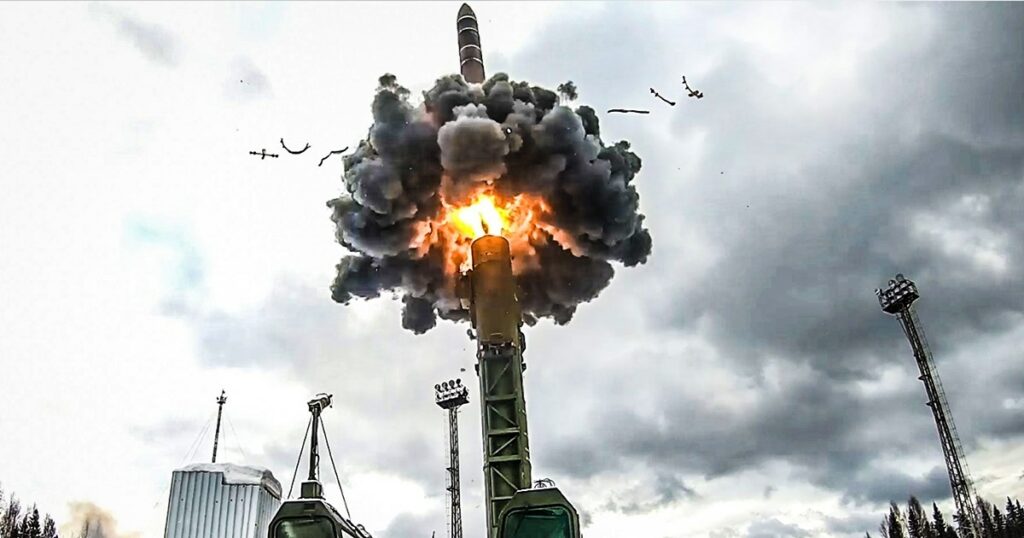On Thursday 24 February of the first day of the current war in Ukraine, Russian tanks surrounded the Chernobyl nuclear power station, in Northern Ukraine.
The word association, nuclear/Chernobyl/Russian tanks, conjures up a truly nightmare image. On Sunday, Day 4, President Putin summoned his Defence Minister and the Russian Chief of General Staff, to put all his nuclear forces on full alert. On Monday, Day 5, Belarus formally allows Russia to place nuclear weapons on Belarussian territory.
The key question remains, is this just part of a psychological warfare campaign, or is this an existential threat which has to be considered, as such, by the international community? When Donald Trump won the US Presidential Election, his UK friend, then MEP, Nigel Farage, said of Trump “You do not have to take what he says, literally, but you do have to take him seriously”. We could now ask the same question of President Putin.
There is a consistency in President Putin’s public statements down through the years, which is that his words usually are matched by his actions. His 5000 word essay on the oneness of the Ukrainian and Russian peoples, published last July, explains the background to his recent decisions over Ukraine. For that reason alone, we must pay attention to what he says, literally. But should we take him seriously?
Consider the following. Over the past year he has been building up towards the current invasion of Ukraine. Last April, when the Russian military build-up on the Border with Ukraine was scaling down, the general conclusion of defence analysis was that the military exercises were a demonstration of power. Few analysts realised that the ‘exercises’ were not standard military exercises as such, but a rehearsal for the current invasion. We now know that President Putin was not bluffing.
The second consideration is that Russia is the only country in the World with the thermonuclear capability of totally destroying the US, or indeed Western Europe, for that matter. For that reason alone, we must take his decision to put his nuclear forces on high alert, seriously. At this stage, this analyst does not know what ‘high alert’ means for the Russian nuclear defence forces. It could be just cancelling leave for personnel, or, at the other extreme, bringing all nuclear units to a state of full operational readiness. As it is, his land and submarine based ballistic missile units are, similar to the US and others, already on alert. To go to a higher state of alert he could up the readiness of his nuclear bomber fleet and or send additional nuclear armed submarines to sea.
If the latter, the US, UK and France may have to up their own states of operational readiness correspondingly, as a deterrent and to avoid being taken by surprise.
Back during the height of the Cold War, the nuclear deterrent was based on the MAD (Mutually Assured Destruction) concept. However, many military planners, in both the US and the USSR believed in the lesser concept, of a limited or survivable nuclear war. Both sides developed smaller tactical nuclear weapons which could be used on the battlefield. Both powers hoped that the battleground could be contained to Europe. Eventually it was realised that once tactical nuclear weapons were used, the losing side would be tempted to move to the strategic nuclear level with the risk of triggering Armageddon.
As things stand today, the Russians have a superior number of tactical nuclear weapons than NATO has in theatre (in Europe). During the pre-Ukraine invasion exercises, Russia showed extensive TV shots videos of Ballistic missiles being fired from land and submarines, plus strategic bombers and the full range of nuclear artillery. However, of course, no nuclear warheads were fired.
If Putin wants to raise tension further, he could threaten to test fire a few nuclear weapons, in defiance of test ban treaties. It is noted that Russian TV has been repeatedly showing convoys of transporters with ICBMs (Intercontinental ballistic missiles). A picture is worth a thousand words. The hope is, that all this is just a part of a Russian psyops (psychological operations) campaign aimed at creating a climate of fear.
As regards Chernobyl, the Russian Defence Ministry has since announced that its occupation was carried out to ensure the security of the site. Since it has been secured successfully since 1986 by Ukrainian authorities, that is about as lame an excuse, as the dog eating the little schoolboy’s homework.


